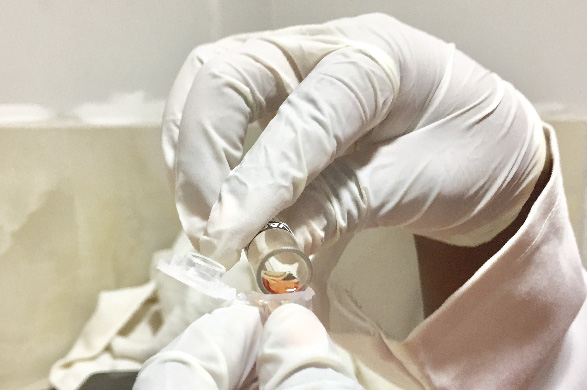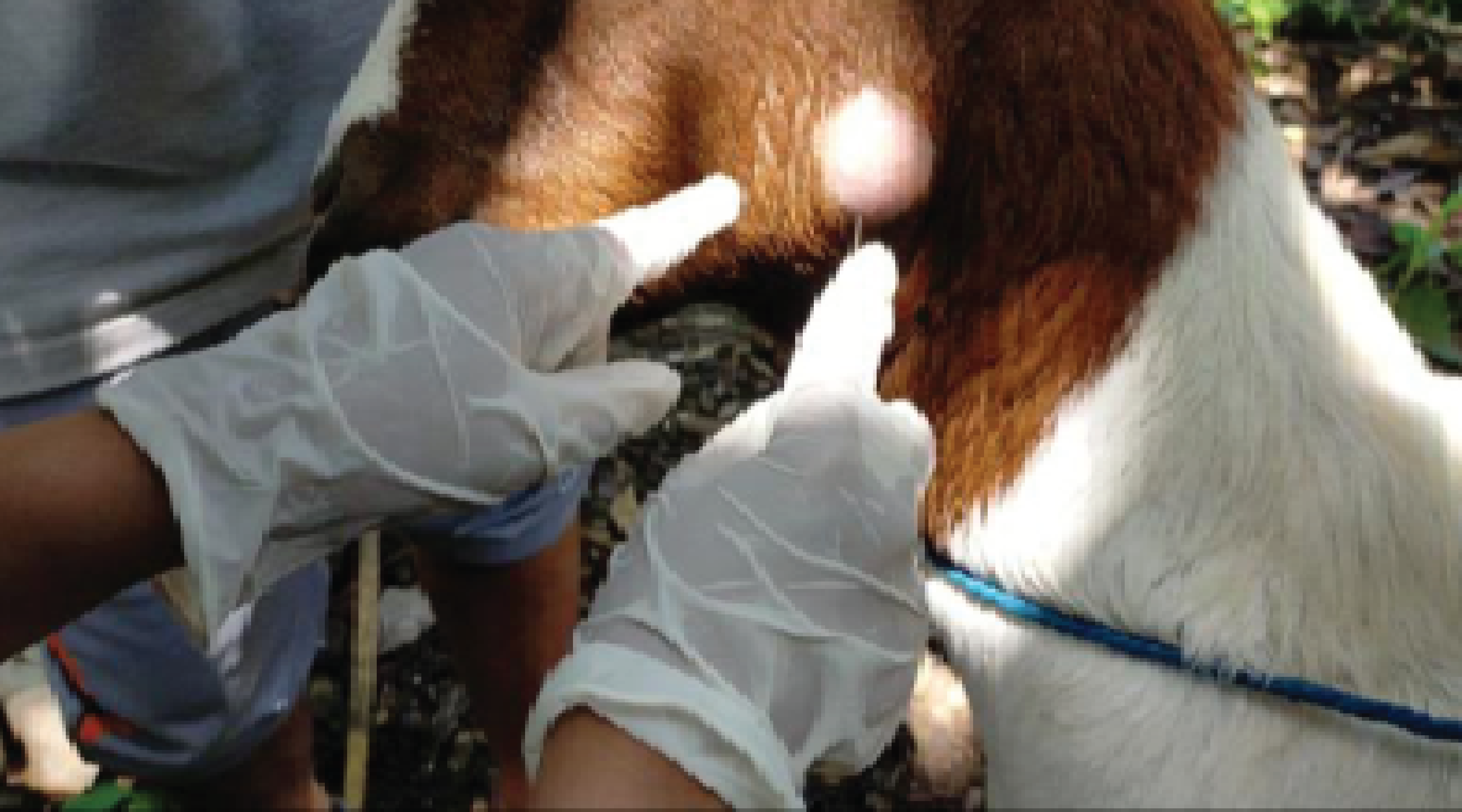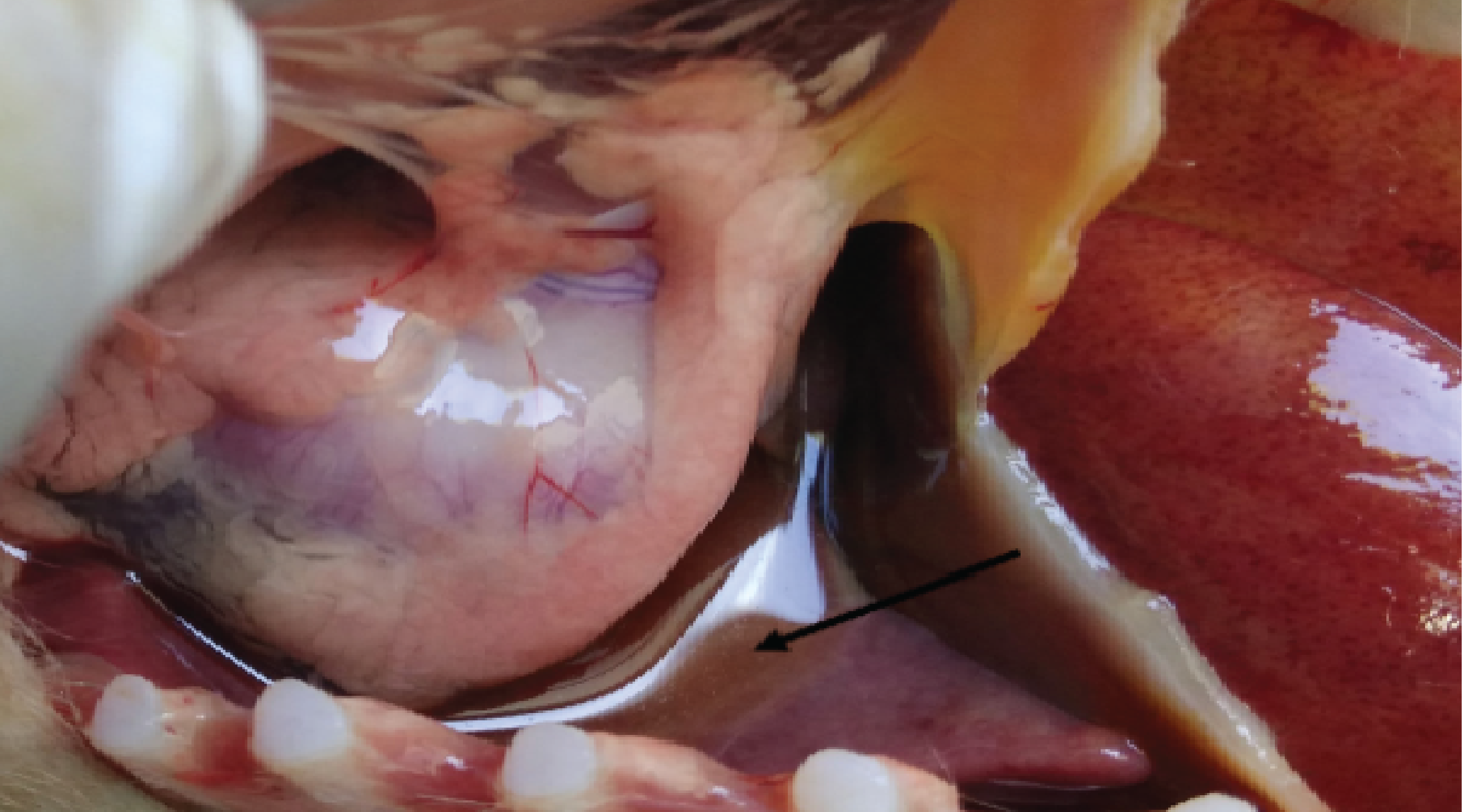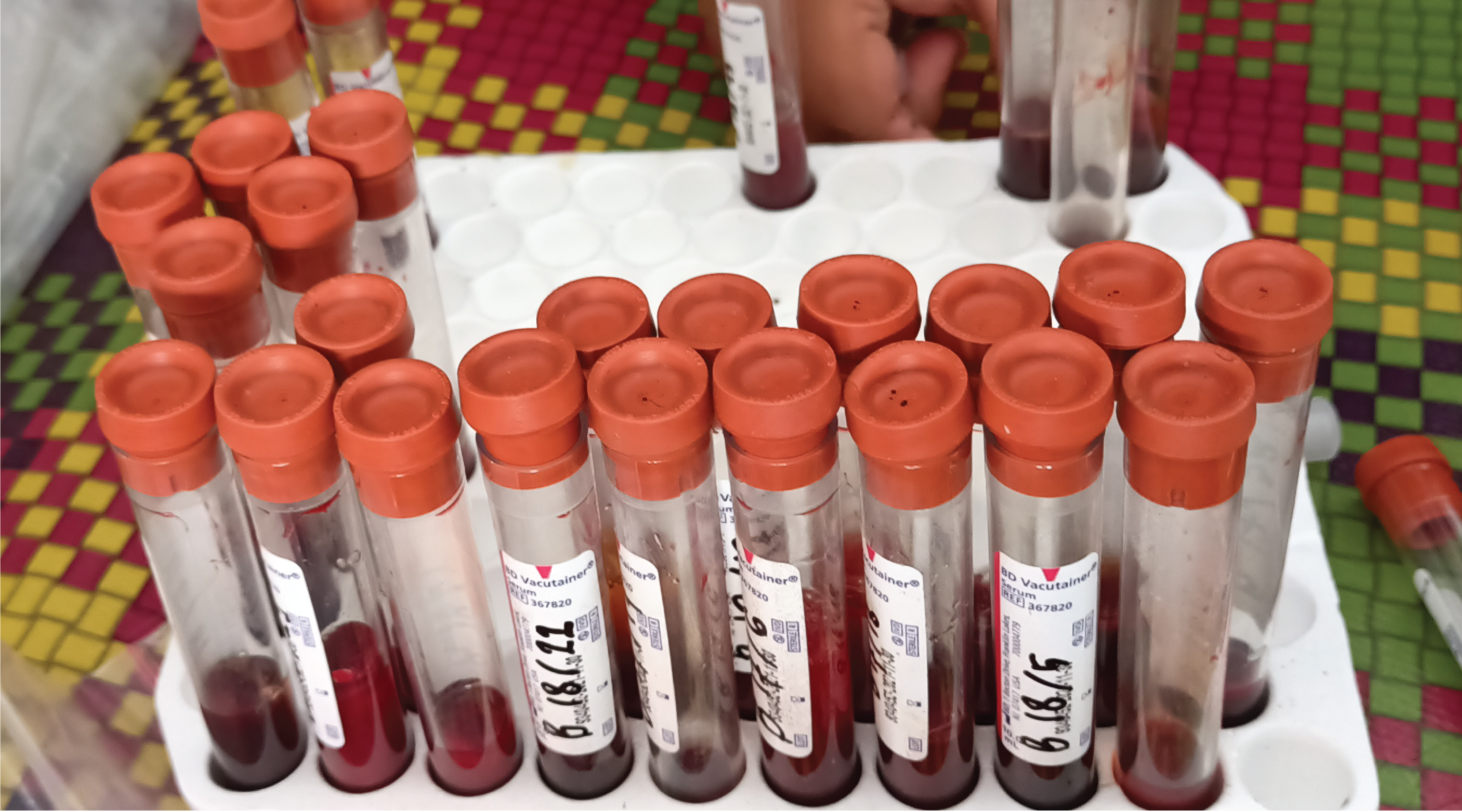Detection of Toxoplasma gondii Infection in Rodents, Shrews and Cats in Unguja Island, Zanzibar

Background:Toxoplasma gondii is an intracellular protozoan parasite that causes a zoonotic infection known as toxoplasmosis. Felid vertebrates including cats serve as the definitive hosts of T. gondii and rodents and shrews are among the common intermediate and reservoir hosts. Little is known about the infection in both humans and animals despite the high interaction between humans and cats on the island. Purpose: This study aimed at determining the prevalence of T. gondii infection in rodents, shrews and cats in Unguja Island, Zanzibar. Method: The study employed a cross-sectional design. A total of 366 small mammals (230 rodents, 43 shrews and 93 cats) were captured and blood was sampled from the seven districts of Unguja Island. Serum samples were subjected to the Indirect ELISA technique with the aid of the ID Screen® Toxoplasmosis Indirect Multi-species Kit to look for antibodies directed against T. gondii. Results: Seropositive samples were detected from one rodent species (Rattus rattus) and one shrew species (Crocidura spp.) among the six different rodent and shrew species captured. Fifty-one seropositive samples from cats were detected where eight were from pet cats and 43 from stray cats. In rodents, no significant variation was found according to species, sex and habitat (p≥0.05) but in cats, there was a significant variation between habitats (p≤0.05). Conclusion: The study revealed the exposure status of rodents, shrews and both stray and pet cats in Unguja Island, thereby revealing the potential risk of the infection transmission to humans due to close proximity with these animals, especially cats as pets. Emphasis should be made through public health education programs about the transmission of the infection and the control measures needed to mitigate the risks.
of Seroconversion to Toxoplasma gondii in Cats (Felis catus) and Oocyst Burden in A Rural Environment. Epidemiology & Infection, 138(8), 1105–1113.
Brouat, C., Diagne, C. A., Ismaïl, K., Aroussi, A., Dalecky, A., Bâ, K., and Mercier, A., 2018. Seroprevalence of Toxoplasma gondii in Commensal Rodents Sampled Across Senegal, West Africa. Parasites, 25, 1-6.
Chalo, S. L., Mafie, E. M., Mwega, E., Mkupasi, E. M., and Kasanga, A. S., 2023. Seroprevalence and Molecular Detection of Toxoplasma gondii Infections in Rodents and Cats in Mbeya District, Tanzania. African Journal of Parasitology Research, 4(3), 1-13.
Cochran, W. G., 1977. Sampling Techniques, 3rd Edition. Wiley, 72-114.
Dubey, J.P., 1988. Toxoplasmosis of Animals and Man. Boca Raton: CRC Press.
Dubey, J.P., and Carpenter, J.L., 1993. Histologically confirmed clinical toxoplasmosis in cats: 100 cases (1952-1990). Journal of the American Veterinary Medical Association, 203(11), 1556–1566.
Dubey, J.P., 1995. Duration of Immunity to Shedding of Toxoplasma gondii Oocysts by Cats. Journal of Parasitology, 81(3), 410–415.
Dubey, J.P., Lindsay, D. S., and Lappin, M.R., 2009. Toxoplasmosis and Other Intestinal Coccidial Infections in Cats and Dogs. Veterinary Clinics of North America - Small Animal Practice, 39(6), 1009–1034.
Dubey, J.P., 2021. Outbreaks of Clinical Toxoplasmosis in Humans: Five Decades of personal experience, perspectives and lessons learned. Parasites and Vectors, 14(1), 1–12.
Elmore, S. A., Jones, J. L., Conrad, P. A., Patton, S., Lindsay, D. S., and Dubey, J. P., 2010. Toxoplasma gondii: Epidemiology, Feline Clinical Aspects, and Prevention. Trends in Parasitology, 26(4), 190–196.
Feldman, E. C., and Nelson, R. W., 2004. Canine and Feline Endocrinology and Reproduction. 3rd Edition. Saunders, 1089.
Fleming, P. A., Crawford, H. M., Auckland, C., and Calver, M. C., 2021. Nine Ways to Score Nine Lives – Identifying Appropriate Methods to Age Domestic Cats (Felis catus). Journal of Zoology, 314(3), 211–226.
Galeh, T.M., Sarvi, S., Montazeri, M., Moosazadeh, M., Nakhaei, M., Shariatzadeh, S. A., and Daryani, A., 2020. Global Status of Toxoplasma gondii Seroprevalence in Rodents: A Systematic Review and Meta-Analysis. Frontiers in Veterinary Science, 7, 1-13.
George, D., and Mallery, P., 2018. IBM SPSS Statistics 25 Step by Step. New York: Routledge, 1-7.
Happold, D. C. D., 2013. Mammals of Africa. Volume 3: Rodents, Hares and Rabbits. London: Bloomsbury Publishing, 27-691.
Innes, E. A., 2010. A Brief History and Overview of Toxoplasma gondii. Zoonoses and Public Health, 57(1), 1–7.
Jilo, K., Tegegne, D., Kasim, S., Dabasa, G., and Zewdei, W., 2021. Seroprevalence and Public Health Significance of Toxoplasmosis in Small Ruminants of Pastoral Community in Yabello District, Borana Zone, Southern Ethiopia. Veterinary Medicine International, 2021, 1-11.
Lepczyk, C. A., Lohr, C. A., and Duffy, D. C., 2015. A Review of Cat Behavior in Relation to Disease Risk and Management Options. In Applied Animal Behaviour Science, 173, 29-39.
McClure, D. E., 1999. Clinical Pathology and Sample Collection in the Laboratory Rodent. Veterinary Clinics of North America: Exotic Animal Practice, 2(3), 565–590.
Meerburg, B.G., Singleton, G.R., and Kijlstra, A., 2009. Rodent-borne Diseases and Their Risks for Public Health. Critical Reviews in Microbiology, 35(3), 221–270.
Mercier, A., Garba, M., Bonnabau, H., Kane, M., Rossi, J.-P., Dardé, M.-L., and Dobigny, G., 2013. Toxoplasmosis Seroprevalence in Urban Rodents. Memórias do Instituto Oswaldo Cruz, 108(4), 399–407.
Mgode, G. F., Katakweba, A. S., Mhamphi, G. G., Fwalo, F., Bahari, M., Mdangi, M., Kilonzo, B. S., and Mulungu, L. S., 2014. Prevalence of Leptospirosis and Toxoplasmosis: a Study of Rodents and Shrews in Cultivated and Fallow Land, Morogoro Rural District, Tanzania. Tanzania Journal of Health Research, 16(3), 1-7.
Montazeri, M., Galeh, T.M., Moosazadeh, M., Sarvi, S., Dodangeh, S., Javidnia, J., Sharif, M., and Daryani, A., 2020. The Global Serological Prevalence of Toxoplasma gondii in Felids During the Last Five Decades (1967–2017): A Systematic Review and Meta-analysis. Parasites and Vectors, 13, 1–10.
Montoya, J. G., 2002. Laboratory Diagnosis of Toxoplasma gondii Infection and Toxoplasmosis. The Journal of Infectious Diseases, 185(1), 73-82.
Montoya, J.G., and Liesenfeld, O., 2004. Toxoplasmosis. Lancet, 363(9425), 1965–1976.
Mulungu, L.S., Makundi, R. H., Massawe, A. W., Machang’u, R.S., and Mbije, N. E., 2008. Diversity and Distribution of Rodent and Shrew Species Associated with Variations in Altitude on Mount Kilimanjaro, Tanzania. Mammalia, 72(3), 178–185.
Mwambe, B., Mshana, S. E., Kidenya, B. R., Massinde, A. N., Mazigo, H. D., Michael, D., Majinge, C., and Groß, U. 2013. Sero-prevalence and Factors Associated with Toxoplasma gondii Infection among Pregnant Women Attending Antenatal Care in Mwanza, Tanzania. Parasites and Vectors, 6(1), 1–5.
National Bureau of Statistics (NBS). 2022. Population and Housing Census. https://www.nbs.go.tz/index.php/ en/census-surveys/population-and-housing-census. Accessed: 1 June 2023.
Onduru, O.G., Rumisha, S. ., Munyeme, M., and Phiri, A.M., 2019. Evaluation of the Level of Awareness of Congenital Toxoplasmosis and Associated Practices Among Pregnant Women and Health Workers in Tanzania’s Temeke district in Dar es Salaam. African Health Sciences, 19(4), 3027-3037.
Parasuraman, S., Raveendran, R., and Kesavan, R., 2010. Blood sample collection in small laboratory animals. Journal of Pharmacology & Pharmacotherapeutics, 1(2), 87-93.
Short, J., Turner, B., and Risbey, D., 2002. Control of Feral Cats for Nature Conservation. III. Trapping. Wildlife Research, 29(5), 475–487.
Swai, E. S., and Schoonman, L., 2010. Seroprevalence of Toxoplasma gondii infection amongst residents of Tanga District in north-east Tanzania. Tanzania Journal of Health Research, 11(4), 205–209.
Torgerson, P.R., and Mastroiacovo, P., 2013. The Global Burden of Congenital Toxoplasmosis: A Systematic Review. Bulletin of the World Health Organization, 91(7), 501–508.
Vollaire, M.R., Radecki, S.V., and Lappin, M.R., 2005. Seroprevalence of Toxoplasma gondii Antibodies in Clinically Ill Cats in the United States. American Journal of Veterinary Research, 66(5), 874–877.
Weiss, L. M., and Dubey, J. P., 2009. Toxoplasmosis: A History of Clinical Observations. International Journal for Parasitology, 39(8), 895-901.
Zhang, H., Dong, H., Mehmood, K., Li, K., Nabi, F., Chang, Z., Rehman, M. U., Ijaz, M., Wu, Q., and Li, J., 2018. Physiological Variations Among Blood Parameters of Domestic Cats at High- and Low-altitude Regions of China. Archives of Physiology and Biochemistry, 124(5), 458–460.
Copyright (c) 2024 Author(s)

This work is licensed under a Creative Commons Attribution-ShareAlike 4.0 International License.
- The journal allows the author to hold the copyright of the article without restrictions.
- The journal allows the author(s) to retain publishing rights without restrictions.
- The legal formal aspect of journal publication accessibility refers to Creative Commons Attribution Share-Alike (CC BY-SA).

Journal of Applied Veterinary Science and Technology is licensed under a Creative Commons Attribution-ShareAlike 4.0 International License





























